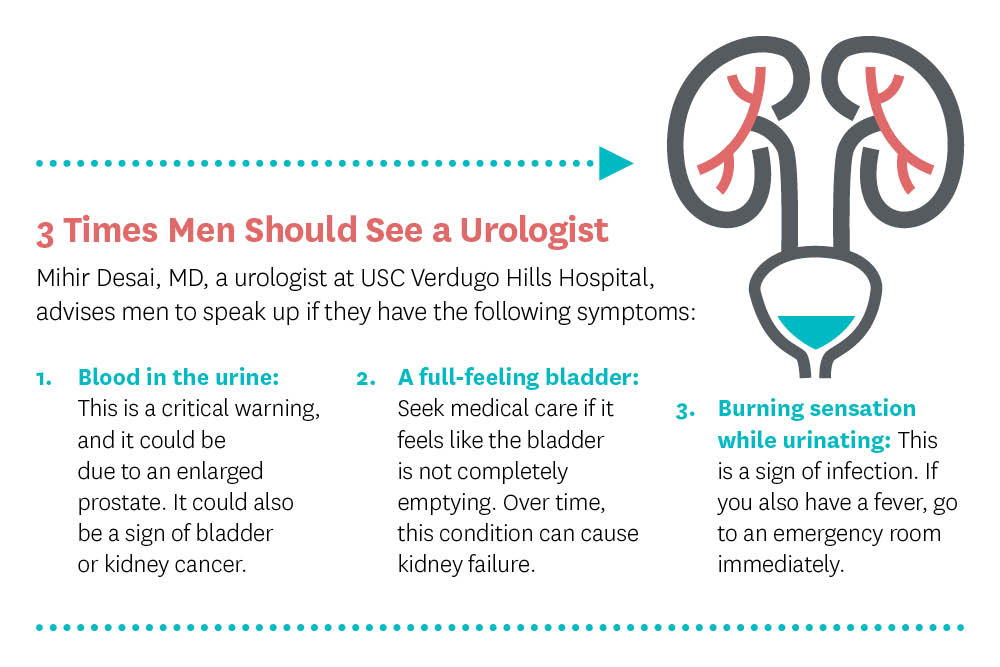
Experts at USC Verdugo Hills Hospital perform water jet ablation, a minimally invasive procedure to help stop frequent urination.
As the vice president of a medical technology company, Rich Lunsford is a road warrior. The 64-year-old crisscrosses the country twice each week to meet with surgeons and hospital leaders.
Rich thrived on the routine until he became increasingly affected by a condition familiar to many middle-aged men: an enlarged prostate gland, or benign prostatic hyperplasia (BPH).
The condition can block the outflow of urine from the bladder, leading to increased frequency and difficulty in urinating.
“Medications had worked fine at first,” says Rich, who was diagnosed at age 47. “But toward the end of my 50s, I started going through spurts of urinating four or five times within several hours — and in my 60s, I had to start excusing myself from meetings to find a restroom.”
In April 2021, the problem grew worse. Rich was on a conference call at his home in Steamboat Springs, Colorado, and felt an urgency to use the bathroom, but he was unable to urinate.
“I was in retention,” Rich says. “My wife raced me to the hospital, where they put in a catheter to drain the urine for seven days, and they put me on new meds.”
A second incident prompted Rich to visit a urologist near his own employer’s headquarters in Irvine. The urologist discovered that his patient’s prostate was twice the normal size.
After consulting with other physicians, Rich was told that his best treatment for enlarged prostate was a relatively new, minimally invasive procedure known as Aquablation®, or water jet ablation.
By harnessing the strength of water — as seen in clinical functions such as ultrasonic plaque removal — the treatment can remove prostate tissue without affecting the anatomy tied to urinary control and sexual function.

Quick, precise treatment for enlarged prostate
Rich contacted the developer of the technology to find the best surgeon in the country who could perform water jet ablation. He was referred to Mihir Desai, MD, a urologist at USC Verdugo Hills Hospital and a recognized expert in robotic and minimally invasive surgeries.
USC Urology at USC-VHH began performing water jet ablation three years ago — it was the first West Coast facility to routinely do so, Dr. Desai says — and the team was involved in clinical trials.
“Before the procedure, a detailed map of the prostate is created using an instrument inserted into the urethra and ultrasound imaging, which pinpoint the tissue to be removed,” Dr. Desai says. “Then, a robotic system removes the tissue using a stream of water, which the surgical team can view and control in real time.”
I don’t have to go to the bathroom as frequently now or scope out where the bathroom is at a baseball game. I can be in the car for long periods, and I don’t need an aisle seat.
Rich Lunsford, patient, USC Verdugo Hills Hospital
Suitable candidates for water jet ablation
BPH affects more than half of all U.S. men age 60 and older (and 90% of men 85 and over), so water jet ablation offers a safe, reliable option.
Surgical options for enlarged prostate can take hours, but water jet ablation takes about 30 minutes, Dr. Desai says. Most patients spend one night in the hospital and leave without a catheter.
The procedure also reduces the chances of side effects that other options can create, such as sexual dysfunction and incontinence.
About 85% of recipients won’t need short-term revision, Dr. Desai says, adding that the success rate is higher than other BPH procedures — and that it’s realistic to recover the urinary function of 20 years earlier.

“Water jet ablation is very quick, it doesn’t require an incision and it uses high-pressure, room-temperature water,” Dr. Desai says.
Candidates should have significantly enlarged prostates, Dr. Desai says, as well as disrupted urination and a desire to preserve sexual function. Men who cannot safely stop blood thinners are not a good fit because they could bleed during the procedure.
For Rich, who is back on the road, water jet ablation was life changing.
“I don’t have to go to the bathroom as frequently now or scope out where the bathroom is at a baseball game,” he says. “I can be in the car for long periods, and I don’t need an aisle seat. Physical activities like hiking and biking are easier to do.”
Topics


